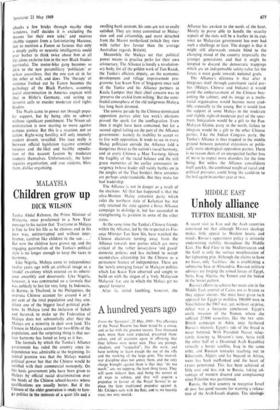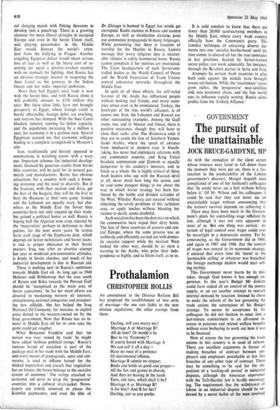Unholy alliance
MIDDLE EAST TUFTON BEAMISH, MP
A recent visit to Iran and the Arab countries convinced me that although Marxist ideology makes little appeal to Moslem hearts and minds, Russia's opportunist policy is seriously undermining stability throughout the Middle East. The Red Fleet in the Mediterranean and the Gulf is only the surface manifestation of her tightening grip. Although she claims to have no bases, only 'facilities,' she is establishing a submarine base at Alexandria. Russian military advisers are forging the armed forces of Egypt, Syria, Iraq, Algeria, the Yemen and the Sudan. in the Soviet pattern.
Russia's efforts to achieve her main aim in the Middle East, control of Cairo, are as brazen as they appear sinister. She must have given tacit approval for Egypt to mobilise 100,000 men in Sinai before the 1967 war, yet, without surprise, defeat was a foregone conclusion. Egypt's costly invasion of the Yemen, where she suffered 25,000 casualties, like the NLF anti- British campaign in Aden, only furthered Russia's interests. Egypt's side of the bread is never buttered. With President Nasser reluc- tantly dancing to Moscow's tune, Syria (still the other half of a Disunited Arab Republic) virtually a Soviet satellite, Iraq in the same orbit, and Russian tentacles reaching out to Khartoum, Algiers and far beyond in Africa, NATO has been outflanked and the heart of CENT() penetrated. This has been achieved at little cost and less risk to Russia, taking ad- vantage of western discord and complacency since Palestine was partitioned.
Russia, the first country to recognise Israel de jure, has good reasons for wanting a relaxa- tion of the Arab-Israeli dispute. The ideologi-
cal slanging match with Peking threatens to develop into a punch-up. There is a growing
clamour for more liberal attitudes in occupied Europe and even in the Soviet Union itself, and playing peacemaker in the Middle East would distract the world's atten- tion from the bullying in Prague. Another crippling Egyptian defeat would mean serious loss of face as well as the heavy cost of re- arming yet again a poverty-stricken country with no stomach for fighting. And Russia has an obvious strategic interest in reopening the Suez Canal as the gateway to the Indian Ocean and her wider imperial ambitions.
More than half Egypt's total trade is now with the Soviet bloc, and with Russia alone it will probably amount to £150 million this year. But these close links have not brought prosperity to Egypt, where foreign credit is barely obtainable, foreign debts are crushing, and tourism has slumped. With the Suez Canal blocked, industry running far below capacity, and the population increasing by a million a year, her economy is in a parlous state. Several Egyptians assured me that economic collapse leading to a complete stranglehold is Moscow's aim.
Iran, traditionally and fiercely opposed" to communism, is watching events with a wary eye. Important schemes for industrial develop- ment, financed by generous credits from Soviet bloc countries, will be paid for in natural gas, metals and manufactures. Barter has obvious attractions -for a country with such a boom- ing economy and the need to diversify. But if the Iranians, with their realism and drive, get the best of the bargain, they will be the first to beat the Russians at their own game. Joidan and the Lebanon are equally wary, but else- where in the Middle East the Soviet bloc countries have not only stepped up their trade, but gained a political bonus as well. Russia is buying half the Algerian wine crop, rejected by the 'imperialists' perhaps in deference to their palates, for the next seven years. In restive Syria each stage of the Euphrates dam, which depends on Soviet technicians and Soviet loans, is tied to proper obeisance to their Soviet masters. Iraq, too, after an abortive attempt last year to moderate pro-communist attitudes, is firmly in Soviet clutches, and much of her industrial development is due to Russian aid.
There is nothing new in Russia's ambitions towards Middle East oil. As long ago as 1940 Molotov told Ribbentrop that the area south of Batum and Baku towards the Persian Gulf
should be 'recognised as the main area of Soviet aspirations.' So far her main efforts are
directed to weakening western oil interests, strengthening national companies and prospect- ing new oilfields. She has helped the Iraq
National Oil Company, for instance, to exploit areas denied to the western-owned tic by the Iraqi government, Now that Russia has an in- terest in Middle East oil for its own sake the game could get rougher.
When Benjamin Franklin said that `no nation was ever ruined by trade' he might have added 'without political strings.' Russia's ruinous brand of socialism is part of the package deal in her trade with the Middle East, and every means of propaganda, open and sub- versive, is used to inflame hatred for the wicked imperialists and preach that 'capitalism has no future; the future belongs to the socialist system" of economy.' The strings attached to economic aid serve to strap the 'progressive'
countries into a cultural strait-jacket. News- papers are strictly censored to please the Kremlin paymasters, and even the film of Dr Zhivago is banned in Egypt lest minds get corrupted. Radio stations in Russia and eastern Europe, as well as clandestine stations, pour out communist propaganda' in many languages. While pretending. that there is freedom of worship for the Muslim in Russia, Lenin's message that 'every religious idea is unutter- able vileness' is subtly hammered home. Russia cannot complain if her motives are mistrusted. The Cairo headquarters of such Soviet-con- trolled bodies as the World Council of Peace and the World Federation of Trade Unions control subversive networks throughout the Middle East.
In spite of all these efforts, the self-styled Saviour of the Arabs has influenced people without making real friends, and many coun- tries refuse even to be intimidated. Turkey, the lynch-pin of the free world's alliances, is of course one. Iran, the Lebanon and Kuwait are other outstanding examples. Among the Gulf states, too, and in Muscat and Oman, there is positive resistance, though they will have to close their ranks after Pax Britannica .ends if they are to avoid the fate of Southern Yemen. Saudi Arabia, where the speed of advance from mediaeval to modern state is breath- taking, has never had diplomatic relations with any communist country, and King Faisal brackets communism and Zionism as equally dangerous to his country's interests, and to Islam as a whole. He is highly critical of those Arab leaders who sup with the Russian devil at all, never mind how long 'the spoon, and he said some pungent things to me about the way in which Soviet strategy has been fur- thered by the feeble and divided attitudes of the West. Whether Russia can succeed without inheriting the costly problems of this turbulent area, or apply leeches without bleeding her victims to death, seems doubtful. .
Arab socialism has been the doormat on which the communists have wiped their dirty boots.
The fate of those countries of eastern and cen-
tral Europe, where the same process was so ruthlessly and efficiently carried out with domes-
tic socialist support while the hesitant West looked the other way, should be as stern a warning to the Arabs, who prize their inde- pendence so highly, and to Islam itself, as to us.
It is cold comfort to know that there are fewer than 20,000 card-carrying members in the Middle East, where every Arab country officially bans the Communist party. The familiar technique of attracting diverse ele- ments into one 'socialist brotherhood' until the time comes to discard all but the true comrades in key positions, backed by Soviet-trained secret police, can work admirably, for instance, through the Ba'athist parties in Syria and Iraq.
Attempts by certain Arab countries to play both ends against the middle have brought severe retribution. While the 'reactionary' states grow richer, the 'progressive' near-satellites sink into economic chaos, and the free world sees its influence rapidly waning. -Russia alone profits from the 'Unholy Alliance.'







































 Previous page
Previous page